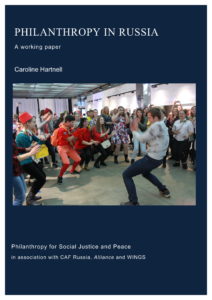By Vyacheslav Bakhmin
 What do we really know about philanthropy in our country, and what do people know about it in other countries? How would we like to present Russia abroad in the world of philanthropy, do we have to be part of global philanthropic society, and if so, why? Do we know about philanthropy in other countries and what use is this knowledge to us? Admittedly, these are not easy questions, but this is exactly the topic which experts and practitioners in the field of philanthropy discussed at a meeting held on 6 February at Moscow’s ‘Blagosfera’ centre for philanthropy and social activism. People talked about Russian philanthropy in an international context, the extent to which we are visible abroad and in demand, and why we are so modest and timid when we do have something to say and to share.
What do we really know about philanthropy in our country, and what do people know about it in other countries? How would we like to present Russia abroad in the world of philanthropy, do we have to be part of global philanthropic society, and if so, why? Do we know about philanthropy in other countries and what use is this knowledge to us? Admittedly, these are not easy questions, but this is exactly the topic which experts and practitioners in the field of philanthropy discussed at a meeting held on 6 February at Moscow’s ‘Blagosfera’ centre for philanthropy and social activism. People talked about Russian philanthropy in an international context, the extent to which we are visible abroad and in demand, and why we are so modest and timid when we do have something to say and to share.
The recently published overview of the state of philanthropy in Russia – a report based on expert interviews and analysis of the  data available – provided a wonderful reason for this meeting. The author of the research was Caroline Hartnell and it was published by the organisation ‘Philanthropy for Social Justice and Peace’ in cooperation with CAF Russia, the ‘Alliance’ newspaper and the ‘Worldwide Initiatives for Grantmaker Support’ organisation (WINGS). The full version of the report in English and a summary of it in Russian are both available on the CAF Russia website.
data available – provided a wonderful reason for this meeting. The author of the research was Caroline Hartnell and it was published by the organisation ‘Philanthropy for Social Justice and Peace’ in cooperation with CAF Russia, the ‘Alliance’ newspaper and the ‘Worldwide Initiatives for Grantmaker Support’ organisation (WINGS). The full version of the report in English and a summary of it in Russian are both available on the CAF Russia website.
Development and analysis
We know that statistics about the development of philanthropy are virtually non-existent in Russia, so it’s not easy to understand what’s going on in this field. You have to rely only on expert opinions and analyse the information available on the internet and social networks, which sometimes includes hopelessly inconsistent data from sociological surveys. Building up a general picture of the state of philanthropy in the country, in all its variety, is therefore very difficult. Every such attempt is all the more valuable.
The report on Russia which has just been published is part of a major project which began in 2016, the aim of which was to present the current state of philanthropy in developing economies. In October 2017 research into philanthropy in India was published, and now it’s our country’s turn.
As I was lucky enough to be one of the experts whom Caroline interviewed, I read the finished document with great interest. It runs to more than 50 pages, and presents the current complicated and diverse picture of the philanthropy that is developing in our country, including expert analysis concerning the drivers of, and barriers to, its development.
In the last few years I don’t recall seeing such a detailed analysis of the general situation of philanthropy in Russia.
I won’t go into the document’s contents again here. It’s available for everyone who wants to read it, and, in my opinion, that’s worth doing. You can see what our philanthropic organisations and socially responsible businesses have managed to achieve in the last 25 years, realise what we can be proud of and what we all need to develop in the future.
I’d just like to mention a few points in the report which seemed to me to be important and interesting.
A variety of experts
First of all, it’s worth noting the variety of experts who represent different aspects of philanthropy. They are rarely heard all in one place. Although all the experts interviewed came from Russia, their opinions were perceived and presented to the reader by a foreign researcher, and we observed the Russian situation through this lens. Among the experts on philanthropy, I found it unusual to see Natalya Taubina, head of the human rights organization the ‘Public Verdict Foundation,’ which campaigns in particular against police torture, and Grigory Okhotin, co-founder of the human rights monitoring project ‘OVD-Info.’ It turns out, according to the author of the report and other foreign researchers, that the activities of such organisations come under the heading of “philanthropy of social justice”, which seems completely reasonable. Perhaps it would be worth us using this classification, too, and it would be useful for more detailed research to be done into this concept.
Technological innovations in the not-for-profit sector
The study lists a considerable number of examples of new applications and technologies used in the not-for-profit sector. Even though this barely scrapes the surface of what Russian charities are actually doing, it makes clear the impressive scale of what has been achieved, and the study is worth reading for this welcome insight alone. I was particularly struck by some extraordinary feats of fundraising described in the report, which made it possible to end previous stalemates and bring certain intractable problems to the authorities’ attention. The problems involved include hospices (previously almost unheard of in Russia) and palliative care in general, children’s homes and orphaned children (a topic which was re-examined thanks to the efforts of charitable organisations) and care for the elderly and seriously ill (including the development of standards for long-term care in hospitals and old people’s homes).
It goes without saying that reports of this kind – and experts as a group – tend to concentrate on achievements rather than problems, even though the overall development of philanthropy in Russia is much more nuanced and the source of significant controversy, not least over the infamous “Law on Foreign Agents.” The sector is also in a state of flux, and some of the information provided is already out of date – something which the author acknowledges, describing the report as a working document and a starting point for future research.
Russia on the international stage
Let us return to the meeting at Blagosfera, where the experts who were involved in the research and who had gathered in the auditorium spent over an hour and a half engaged in a heart-to-heart discussion and learned a great deal from each other. The need to cooperate with other countries and international organisations emerged clearly.
Philanthropy is one of the few languages which allows us to talk with people from a different world, since we share many of the same problems and successes.
In essence, we are already part of this global philanthropic world; a quick glance at surveys of the situation in various countries reveals that we are not so very different, and this is good news.
Russia is very definitely present on the international stage, regardless of how it is presented there. There is nevertheless a language barrier which means that little is as yet known about the country. How can we advance our cause in the international arena? What do we need to do? We could translate texts about our philanthropic work into English, and perhaps create something resembling a digest of Russian philanthropy.
It would be useful to have an English version of the website, and to write posts in English alongside the posts in Russian. It’s also a good idea to find out about cases in other countries in various sectors.
We often tend to isolate ourselves, engaged in our own concerns, and this hinders development.
Experts must be invited to make contributions, and we ourselves should participate actively in various international events and seek out related opportunities. We should not attend as observers, but as fully-fledged participants with stories of our own to tell. There is no shortage of these stories, and we can also talk about the serious mistakes we have made so that others can benefit from what we have learned. It is customary for both parties to cooperate at a practical level, with internships and training courses on both sides. At the end of the discussion, all of the participants were unanimous on one point – that we need to look beyond Russia’s borders, and we should preferably do so together.
The organisers have promised that more discussions about philanthropy will be held at Blagosfera.
This post was first published in Russian on February 13 2018 by CAF Russia on www.philanthropy.ru in Russian. To read the post in Russian, click here.
It has been translated by Rights in Russia (translators: Joanne Reynolds and Suzanne Eade Roberts) which first published the post in English on 2 March 2018.